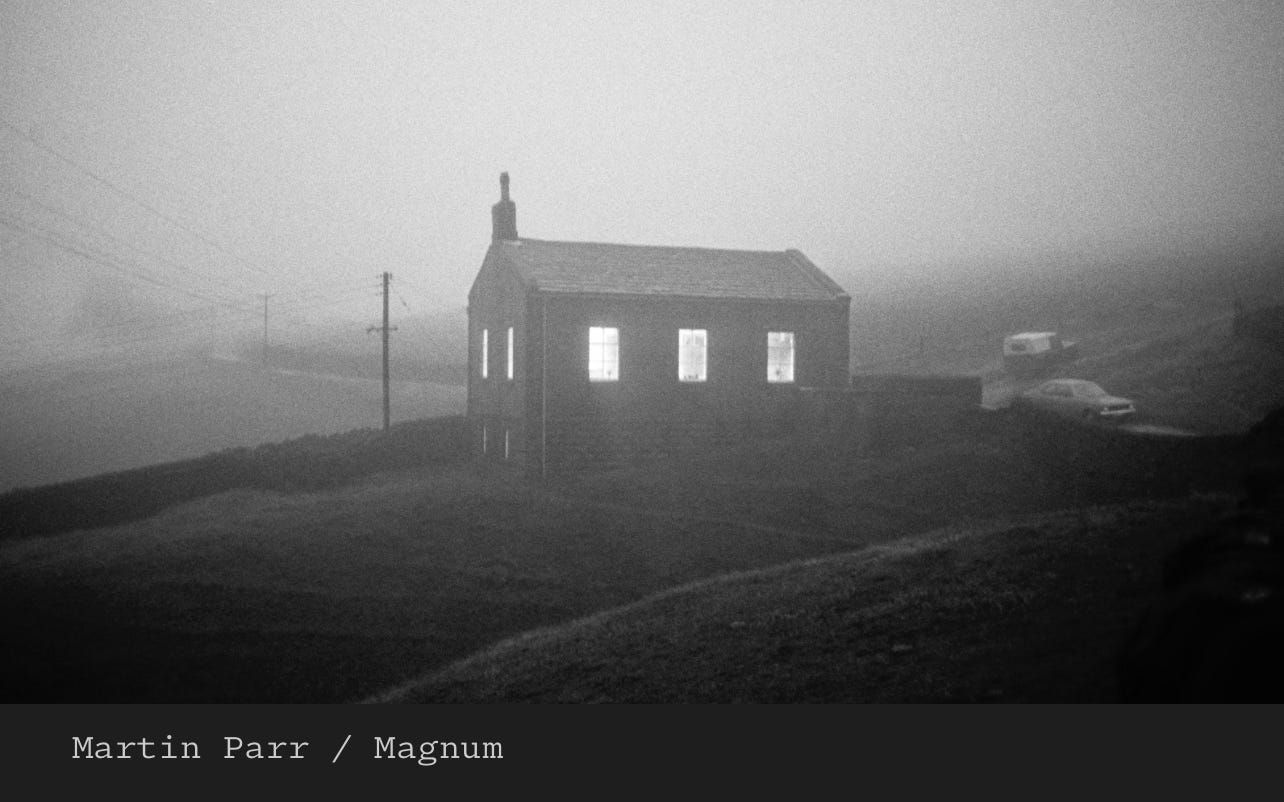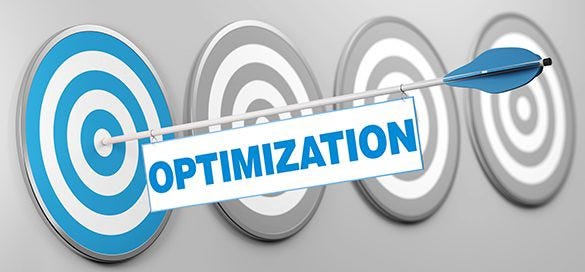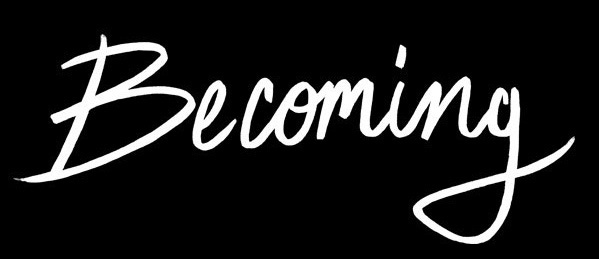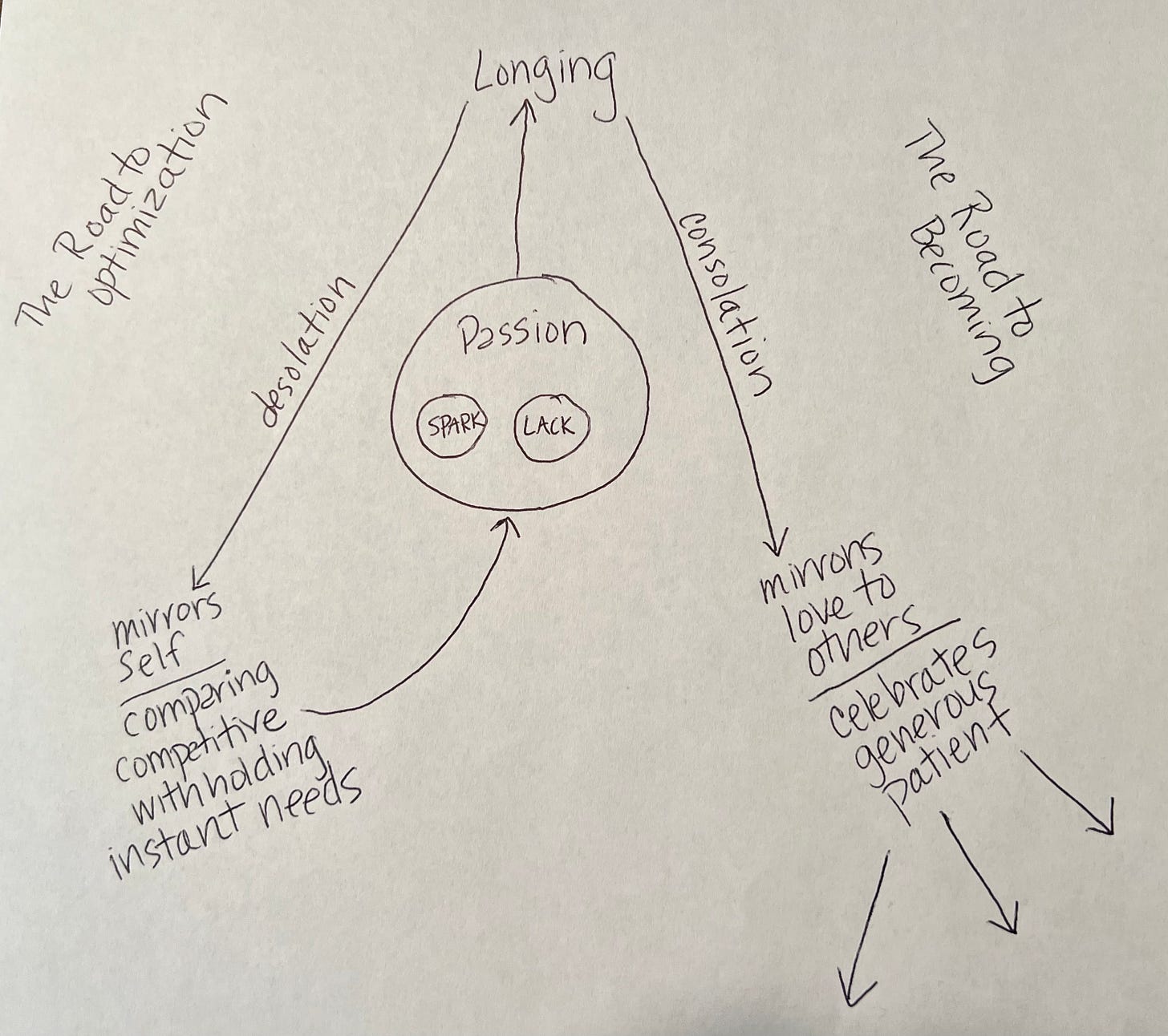Finding Meaning in Community: Becoming vs. Optimizing
Part 2- Reflecting the Source of Love to a Hurting World
Note: In this article I refer to “church” because this is my root tradition, but please substitute “community” or “synagogue” or whatever word best reflects your experience. What I’m talking about here can be universally applied.
“Our unveiled gaze receives and reflects that brightness of God until we are gradually turned into the image that we reflect."
- The Universal Christ, Richard Rohr
In my last post I mentioned a new survey that found for the first time ever, over half of Americans do not attend a place of worship be it a church, synagogue, or mosque. Only 47% say they do. But, in an article that came out in the Atlantic this week, American Religion is not Dead Yet (cue Monty Python), Wendy Cadge and Elan Babchuck claim that this statistic does not preclude religious practice, rather people are finding new and innovative places that build community outside of religious spaces. I find that pretty inspiring.
But the old metrics of success—attendance and affiliation, or, more colloquially, “butts, budgets, and buildings”—may no longer capture the state of American religion. Although participation in traditional religious settings (churches, synagogues, mosques, schools, etc.) is in decline, signs of life are popping up elsewhere: in conversations with chaplains, in communities started online that end up forming in-person bonds as well, in social-justice groups rooted in shared faith. - American Religion is not Dead Yet, the Atlantic (Jan 16, 2023)
A lot of people might see the diaspora of faith communities problematic. What happens if there’s false doctrines taught? If there’s not oversight for systems of power? If vulnerable people are taken advantage of? And these are good and important questions, but the communities that the Atlantic article points to are actually small, usually local community groups that would rather “do church” in action oriented and creative ways. Communities wanting to move away from the, dare I say capitalist, megachurch model and more towards the advice that pastor/poet Eugene Peterson gave when asked how one should look for a church. He said, “find the smallest, closest church to where you live.”
But just belonging to a church or synagogue doesn’t make you “spiritually generative” no more than taking a meditation class makes you a bodhisattva. So I’ve been thinking a lot lately about what is it that actually transforms us? That makes meaning, not in a “I need to optimize my productivity” kinda way but in a “fruits of the spirit” kind of way?
Galatians 5:22-23
But the fruit of the Spirit is love, joy, peace, patience, kindness, goodness, faithfulness, gentleness and self-control. Against such things there is no law.
Which brings me to optimization. I was reading a Substack article by Nadia Bolz-Weber a few weeks ago. One of the things Nadia does well is put us white women in our place. She is critical of the self-care movement in the hands of white woman. And I get it. It also stings a little. But like she’s said, a yoga retreat in Maui where you give up your Aperol spritz for a week is not a spiritual practice - it’s a f*cking vacation. It’s fine, there’s nothing wrong with it, but call it what it is, right?
The article I read (Fall on Your Knees) was not about the self-care culture per se, but this sentence stood out to me and pinched.
“Which makes me wonder if perhaps our obsession with self-improvement is really just a form of atheism disguised as spirituality.”
ugh. That hurt. So I wrote in the comments:
“Yes! AND.. I struggle with these kinds of arguments. I’m not arguing that a bunch of middle aged white women taking supplements and doing yoga is self-improvement. But I do think self improvement includes 12-Step programs and therapy and communities of care and all kinds of things that bring us to our knees. Sometimes this line of thinking feels unnecessarily shame inducing.”
To which she replied:
“Agreed! I think more the treadmill of ‘optimization’ is the problem.. not real personal work.”
Read that again. That was a big a-ha.
Optimizing as opposed to … say.. Becoming. Just say those two words out loud and feel the difference in your mouth. One feels mechanistic and the other organic. One feels like a quick fix with short sharp sounds and one feels like the slow work of a long hum.
Optimizing is something we do with algorithms and meeting agendas. One cannot optimize a sunset or a friendship or a spiritual community or practice. These are things that simply become. They emerge as Brian McLaren and others noted in the Emergent Church movement. In Rohrian language Optimizing is in the transactional camp. It’s concerned with sacrifice in exchange for self-fulfillment. Becoming is in the transformational camp and is concerned with self-emptying for the sake of Love.
Let me explain with a pattern I’ve been formulating. This is not my thinking per se but a distillation of a lot of the teachers I’ve been learning from over the last several years.
The Process of Integrated and Disintegrated Spiritual Practice
First, we start with the idea that we all have deep within us a divine spark, a potential for capacious, life-giving love. We also have deep within us a sense of lack. Might this be the mythic origin of original sin? Not that our core essence starts with failure, but it is hard to deny that we all experience this sense of existential discontent. It’s a universal human experience, no matter our circumstances.
Around this swirling co-existence of lack and divinity forms a Passion. Passion is an odd word. We want to be passionate people because in modern culture we’ve equated passion with drive. And to be driven is to be successful. And yet, the original meaning of passion is actually to suffer. Here we go, already we can see the disconnect between a practice of becoming and a practice of optimization that promises if you suffer you will achieve.
So this potent divinity and this lack form a sense of suffering in the form of passion. These passions become archetypes that can play out in our personalities and life choices. But even though we might not all have the same passions, our passion creates within all of us a sense of longing. And it is in this longing, in how we fill this longing, that we practice our spiritual selves. Just as we are all physical beings, all mental beings, we are also all spiritual beings. But also just as some of us have whole, healthy physical and mental selves and some have fragmented, unhealthy physical and mental selves; so too can we be on a spectrum of health and integration in our spiritual selves.
We have measurements to determine our levels of health in our physical and mental states, but how do we measure our spiritual health?
Well the image that the Christian tradition uses most to identify spiritual health is that of a vine that bears fruit. What does that mean? Are we talking about being productive? Again that sounds a lot like optimization. It sounds like guilt inducing, “am I doing enough?”
Rather I think it’s about where our longing leads us. This is my napkin doodled philosophy below. In the model I’m working out, what we fill the longing with in lots of instances doesn’t matter. What matters is our relationship to our longing. Does what we fill our longing with move us to simply gaze at our own reflection leading to comparing ourself to others, withholding and fear and an urgency for self-gratification? Or does our longing move us to reflect the Source of Love to the world leading to celebration, compassion, generosity and patience. Does it lead us to those fruits of the spirit in Galatians?
Let me give you an example, I’m someone who tends to fill my longing with learning. Learning is a spiritual practice for me. But my relationship to my learning can move down the road of optimization. It can keep me isolated from people and experiences. It can be ego-driven. It can be simply for stimulation that is never truly fulfilling. It can be a dopamine hit. But, learning for me can also be leveraged in my work as a spiritual director. It can lead me to a greater understanding of the world and my part in it which is humbling. It can drive the teacher in me to want to share conversation and ideas through deep listening. It can embed in me a beginner’s mind set. It can pull me to my knees.
Notice that when our longing leads us to simply mirror ourself to ourself this just brings us back to our passion, our own suffering. It’s a closed loop system. But, when we reflect love in this self-emptying (not self-denying) way, this is the truly productive or generative way of being. This is the way that bears fruit.
Notice also that neither path is associated with happiness or sadness. These emotions can happen anywhere so it’s not the superficial feelings that give us information about our spiritual health, rather it’s desolation (a sense of disconnection from Love) or consolation (a sense of connection to Love) that is more indicative of our health. Of course we all feel both desolation and consolation most days, but if you are having a difficult time even naming times in your day when you feel connected to Love, to God or the God of your understanding, then perhaps you need to lean less into trying to optimize yourself and more into the gentle slow work of becoming.
Do you feel like you’re on a treadmill never reaching your destination and only getting more and more frustrated? Or do you feel a sense of adventure knowing the road is long and while you might never get there, you understand the journey is where the goodness resides? We’re alone on a treadmill but we journey together
So how does this inform the future of spiritual communities?
Most Americans no longer orient their lives around houses of worship. And that loss is about more than just missing out on prayer services. It means that when people move to a new city, they have to work much harder to find new friends than previous generations did. When someone falls ill, they might not have a cadre of their fellow faithful to offer home-cooked meals and prayers for healing. This reorientation away from houses of worship is one of the factors that has led to the decline of a sense of community, the rise of social isolation, and the corresponding negative effects on public health, especially for older adults. - American Religion is not Dead Yet, the Atlantic (Jan 16, 2023)
Well, I think what it tells us is that we can’t do spiritual practice in isolation. We need community. That community can look very different - from online and dinner communities with a handful of people to communities who meet weekly to care for the unhoused to daily 12 Step groups to a once a month spiritual direction relationship. And it can look like the traditional spaces of a church, synagogue or mosque. But it is not the space or format that makes our spiritual practices whole and healthy; it is our relationships with the people in them who help us understand what it looks like to reflect the Source of Love to a hurting world.
In the final lines of Richard Rohr’s book The Universal Christ, Rohr references 2 Corinthians 3:18 when he says “our unveiled gaze receives and reflects that brightness of God until we are gradually turned into the image that we reflect."
So the reflecting of Love is our Becoming. The Becoming of Love itself.
How beautiful is that?
What do you need from a community to help you follow the path of becoming as opposed to the path of optimization?
A space for silence and contemplation with others?
Me too
A space for real relationships where I can be wholly my messy self?
Me too
A space where creative collaboration happens all the time and everywhere, where it’s built into the structure of the process?
Me too
A space with opportunities to put into practice reflecting love to a broken world from our own broken selves?
Me too
Maybe not all these resonate with you. Maybe you have ideas of your own. I’d love to hear what they are.
Before writing Part 3 of this series on reimagining sacred community I need a favor. I’d love to hear from you. Any and all of you. Whether you love your community or find yourself relieved that you’ve finally left. Whether you have a spiritual life that includes God language or is triggered by it. Whoever, wherever you are - your voice is important to me.
So here are your options -
Reply to this email with your thoughts.
Send me an email at aspiralspace@gmail.com
Or if you’re willing, let me know if you’d be open to a zoom call with a small group of people to share and discuss these ideas.
Questions to ponder:
What do you need from a community for your spiritual health?
What do you need from a community to help you create meaning and purpose?
What do you need from a community for safety and belonging?
What have you always longed for and never received?
Thanks for engaging these questions with me friends and boy are you engaging. The last post has become one of the most read posts with the most responses since I’ve started this substack two years ago. Grateful for your voices.
Be well friends,
Kelley





